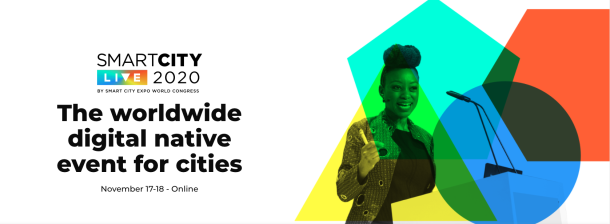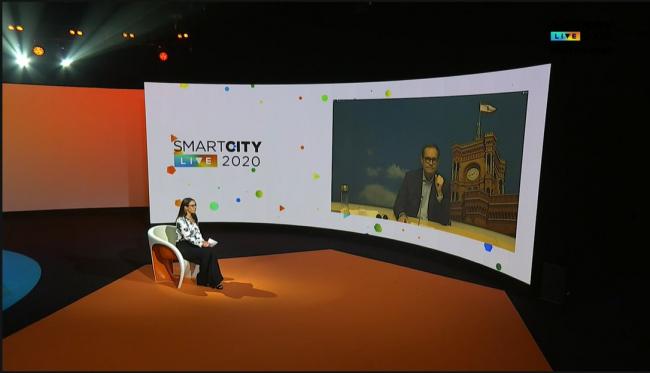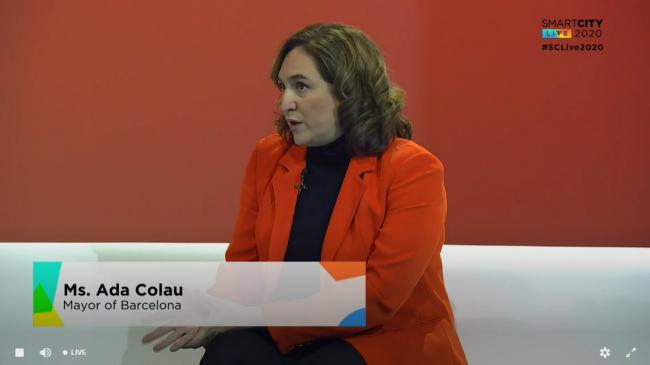
Metropolises from around the world meet at Smart City Live
How are metropolises responding to the Covid-19 pandemic? What role do local and regional governments play in the recovery process, and how can they prepare to face future crises? These were some of the questions tackled during Smart City Live, the online version of the Smart City Expo World Congress.
This year’s Smart City Live brought together leading actors, institutions, and international experts on smart cities on 17-18 November in a virtual format. Insights from metropolises around the world had a remarkable impact during the event’s interactive discussions on how to improve urban resilience while preserving the goal of creating more liveable and sustainable cities worldwide.
City leaders have had to react very quickly to respond to the needs of their citizens, both with regard to pre-existing issues that have been accentuated by the Covid-19 pandemic, and the new challenges that have arisen.

“We have to be critical of ourselves, we still have to invest more in digital transformation, we need to invest more, and we need to see a greater readiness within the population.” Michael Müller
In this regard, Michael Müller, Governing Mayor of Berlin and President of Metropolis, pointed out during the event that higher education, research and digitalisation have been top priorities for Berlin, although there are a number of different aspects to be improved regarding the latter.

Ada Colau, mayor of Barcelona and Co-president of Metropolis highlighted that unaffordable housing is a major challenge in global cities worldwide that puts human rights at risk. To address this, Colau expressed the importance of working from a multilevel perspective and learning from others.
“Learning from the experience of other cities, in Barcelona we are promoting more sustainable housing and public-private initiatives with a metropolitan operator.” Ada Colau
The event also allowed participants the opportunity to delve deeper into the importance of finding solutions at a metropolitan scale, and build upon ways to overcome the challenge of inter-jurisdictional coordination in dealing with the pandemic.
In this regard, Claudia López, mayor of Bogotá; Antoni Balmón, Executive Vice-president of the Barcelona Metropolitan Area; and María Jesús Vega, General Director of the Corporation of Regional Development and Tourism for the Santiago Metropolitan Government, had the opportunity to exchange different insights and priorities on the strengths of metropolitan governance in coping with the pandemic, sharing the different experiences and actions undertaken during the crisis.
“The creation of the Department of Cundinamarca, which integrates 116 municipalities, will allow us to close the urban-rural gap. It will allow us to integrate environmental, economic and social issues in a much more sustainable way.” Claudia López
The current context of global crisis needs urban actors and city leaders to be more connected than ever before, in order to improve together and to share best practices for coping with the pandemic.
Along these lines, we organised a session to present our collaborative platform Cities for Global Health, and invited the Directors of International Relations for Belo Horizonte and Daegu, Hugo Salomão França and Kiseok Lee respectively, to share their insights on the impact, opportunities, and transformations that cities are going through as a result of the Covid-19 pandemic. The discussion was moderated by Agnès Bickart, Senior Manager for Institutional Relations and Asia Portfolio at Metropolis.
The Daegu Metropolitan City has become very popular because of its rapid and effective actions against the spread of the Covid-19 pandemic. At the beginning of the pandemic, Daegu managed to implement prompt, large-scale testing, and a pre-emptive response through different levels of patients and professionals. According to Lee, there are three basic elements that allowed Daegu to succeed in tackling the pandemic: cooperation across three different levels—between central and local governments, public and private sectors through public-private-partnerships, and citizen cooperation.
From the experience in Belo Horizonte’s metropolitan region—the third largest metropolis in Brazil and seventh largest in Latin America—, weak metropolitan governance has been one of the main challenges in implementing effective and coordinated responses in the region. According to Salomão, “lacking a defined metropolitan governance, the measures implemented in one city weren’t necessarily followed by others, losing some of their effectiveness and reach.”
As a leading example in the management of the pandemic in Brazil, Belo Horizonte was the first Brazilian capital to implement social distancing policies and close establishments, while it also created a crisis committee led by scientists, specialists, and technicians.
Both metropolises agreed on the importance of communication management in dealing with the pandemic. Different communication actions had to be developed to ensure that the most vulnerable groups, who often live in informal settlements, were not left behind.
Watch the side events from Smart City Live:
- Cities for Global Health: a city-to city platform to face the pandemic
- Strengthening metropolitan governance
Visit the Cities for Global Health platform!
Financed by:


